The Three Pyramids Spread
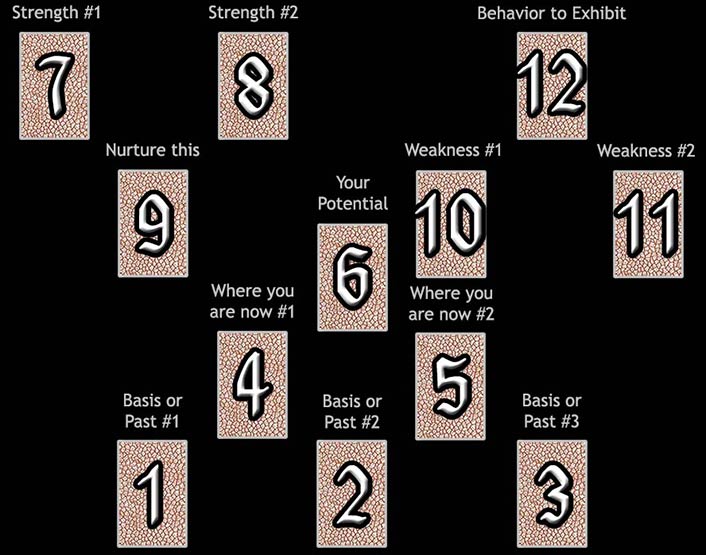
Difficulty: Complicated
Basically, there is the main pyramid in the centre, and two smaller pyramids on each side. One is inverted.
Positions 1 & 3 represent where the reader comes from, or what has made them/shaped them on the various levels. Can be from environment, upbringing, schooling, etc. A look at the past, but with more objectivity than is usually given when using tarot cards.
Positions 4 & 5 represent who the reader is right now. May or may not make pleasant reading, but hey, this is what this is about, right?
Position 6 represents who the reader could be. Again, it might or might not look good, but a person can learn from that and change who they are accordingly. (This is a bit like how Scrooge did things in 'A Christmas Carol'.)
Positions 7 & 8 are the reader's strengths. This is the light they have, which can be bought to the forefront. What carries the person should not be hidden or unacknowledged.
Position 9 represents what should be given to oneself or created within.
Position 10 & 11 represent personal areas for development or weaknesses. Again, might not make good reading, but if someone looks at their strengths first, they will be able to see a balance is there and can choose to focus on one side or the other. This is where a person could really see how their shadow side comes into play.
Position 12 represents what the reader should be offering externally, or what they can bring to their world or to others who inhabit that world.
Your Three Pyramids Reading
Strength #1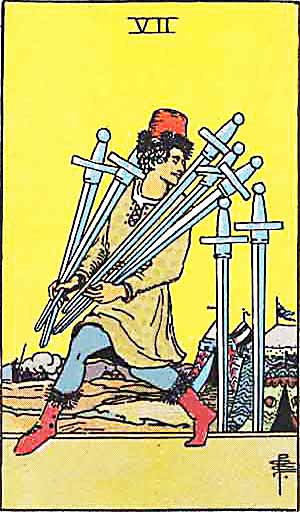 |
Strength #2 |
 |
Exhibit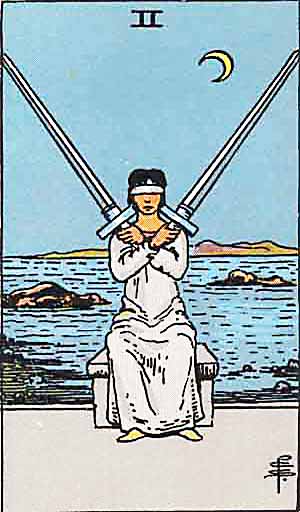 |
|||
Nurture This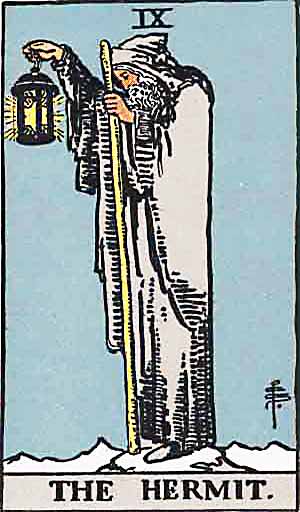 |
Potential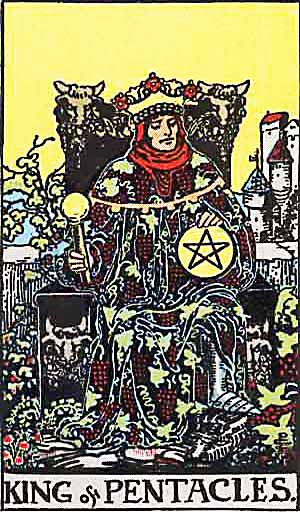 |
Infirmity #1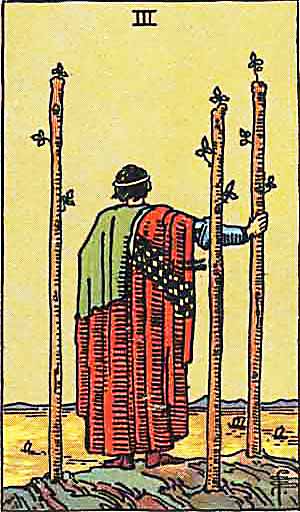 |
Infirmity #2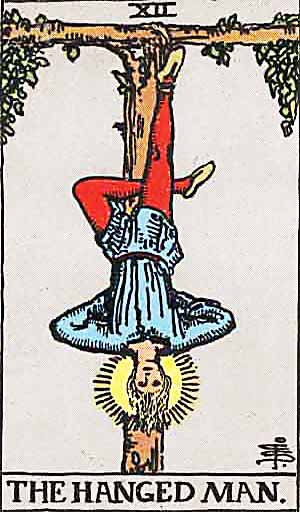 |
|||
Now #1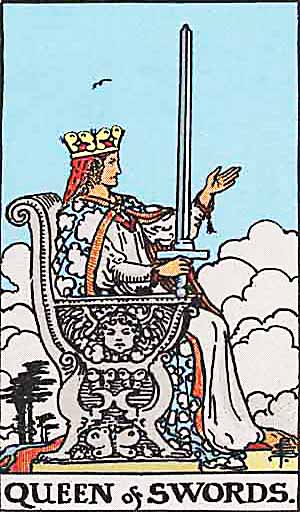 |
Now #2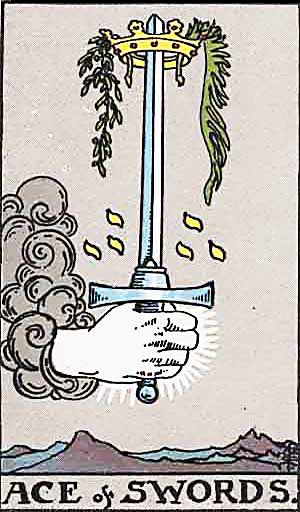 |
|||||
Base (past) #1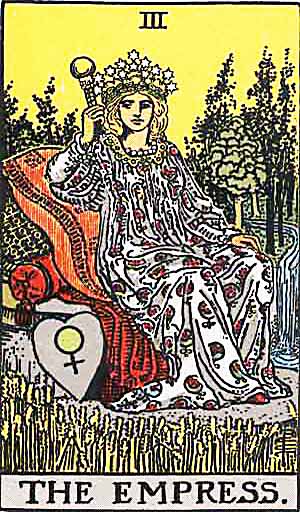 |
Base (past) #2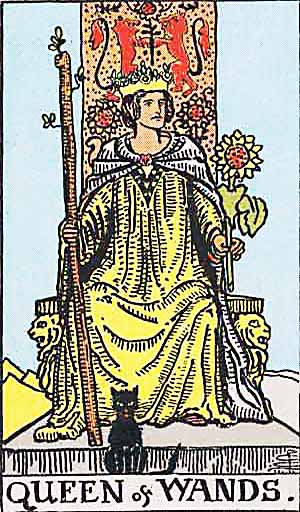 |
Base (past) #3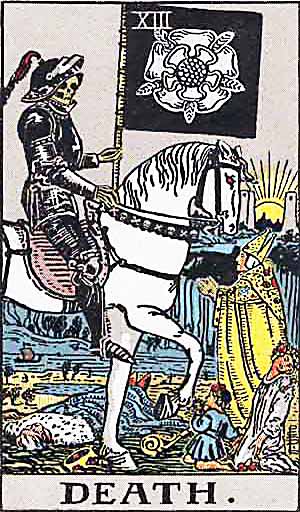 |
1: Base #1

The Empress represents fertility, abundance, nurturing, and creativity. This card embodies the power of creation in all its forms, whether the birth of new ideas, projects, or actual life. The Empress sits upon a throne adorned with symbols of nature, such as a crown of stars and a field of grain, indicating her connection to the natural world. She exudes warmth and compassion, representing the qualities of motherhood, care, and emotional support. She is a symbol of nurturing energy, encouraging growth and the flourishing of all that is tended to with love and patience.
Reversed, the Empress can indicate a lack of care towards oneself or others. It may suggest that you are neglecting your own needs or failing to provide emotional support. This card reversed can also point to creative blocks or a stifling of your potential, where growth is hindered by external or internal forces. It may urge you to reconnect with your self-care practices, take time for personal nourishment, and allow creativity to flow freely once again.
In Relationships: The Empress signifies a time of nurturing and care. It suggests that love will flourish when both partners express their emotions and support each other's growth. This card can indicate a deep, loving connection, or emotional abundance in one's romantic life. It may also point to the potential for starting a family, deepening commitment, or creating new foundations in relationships. The Empress reminds you to embrace love with an open heart and a spirit of generosity.
In Work: The Empress signals a time of creativity and growth in one's professional life. It suggests that hard work and nurturing will lead to fruitful results. This card can also indicate a period of abundance, where new opportunities will manifest. The Empress encourages you to care for your projects with patience and love, as this will lead to lasting success. She may also point to the importance of self-care and work-life balance to sustain long-term achievement.
Spiritually: The Empress represents the divine feminine energy and the spiritual aspects of nurturing, creativity, and abundance. It invites you to embrace your creative potential and nurture your inner growth. This card calls for a heart open to the blessings of the universe. The Empress also encourages connection with nature for spiritual nourishment. She embodies the nurturing force of the universe, reminding us that creation begins with love and care.
2: Base #2

The Queen of Wands embodies confidence, warmth, creativity, and the ability to inspire others. It represents a powerful, passionate energy that is both nurturing and assertive. The Queen of Wands is a woman of action, someone not afraid to step into the spotlight and take charge of her life and circumstances. She radiates self-assurance and charm, attracting others through charisma and enthusiasm. Depicted with a sunflower and a black cat, the Queen of Wands is in touch with her intuition and creativity, and she uses these traits to manifest her desires and lead others with grace.
This card symbolises personal power, creativity, and the drive to achieve goals with energy and passion. The Queen of Wands is someone in control of her passions, who uses them to fuel her ambitions, whether in career, relationships, or personal growth. Her leadership is not about dominating others but empowering and inspiring those around her. The Queen of Wands reminds you to step into your own power, trust your creative instincts, and pursue your goals enthusiastically.
In Relationships: The Queen of Wands represents confidence, warmth, and attraction. This card suggests a period of emotional connection, where you and your partner are in sync, both passionate and supportive of one another. The Queen of Wands encourages being bold in love, expressing desires and needs confidently, and creating a relationship full of joy. For those who are single, the Queen of Wands signifies the potential for attracting a romantic partner who embodies warmth, strength, and charisma. This card invites you to approach love with a sense of self-assurance, knowing that you deserve a passionate and fulfilling relationship.
In Work: The Queen of Wands signifies success, leadership, and creative energy. This card suggests you are in a position where you can take charge of your professional life, whether by leading a team, initiating new projects, or inspiring others with your vision and passion. The Queen of Wands is a natural leader, and her creativity and drive make her well-suited for roles that require innovation, problem-solving, and the ability to bring people together. This card encourages you to trust your instincts and embrace your natural leadership qualities, knowing that you can manifest your goals gracefully.
Spiritually: The Queen of Wands represents a time of empowerment and self-discovery. You are being encouraged to trust your intuition and follow your inner guidance as you navigate your spiritual path. The Queen of Wands is deeply connected to her inner fire, and this card invites you to cultivate that same energy within yourself. It suggests a time of creative spiritual exploration when you can tap into your personal power and intuition to find new avenues for growth and insight. The Queen of Wands reminds you that your spiritual journey is one of empowerment and that by embracing your true self, you will attract the experiences and wisdom you seek.
3: Base #3

Death represents transformation, endings, and rebirth. It is a symbolic death, signifying the end of one phase of life and the beginning of another. A skeletal figure on horseback with a scythe reminds us that change is inevitable and letting go of the old makes room for the new. It signifies the natural cycle of life, where death is a transition, not an end. This card calls for releasing what no longer serves, allowing you to shed old habits or beliefs holding you back from growth.
Death may appear when you face a period of significant change or the need to release attachments. It encourages you to embrace these transitions with trust and understanding, knowing that they are part of the cycles of life. The end of something can be an opportunity for renewal, as old patterns give way to new possibilities. Death is not to be feared but embraced as a natural part of the journey of life.
In Relationships: Death signifies the end of a phase, which could be a breakup, a transformation in how two people relate, or letting go of old patterns that no longer work. This card indicates that the relationship may be going through a period of change, and it encourages you to embrace that change rather than resist it. Death invites rebirth—whether the opportunity to renew the relationship by letting go of baggage or the possibility of closing the chapter to make space for new, healthier connections. This card reminds us that endings, though painful, are necessary for growth and new beginnings.
In Work: Death signifies a major transformation, signalling the end of one chapter and the beginning of another. It may indicate the closing of a professional project, a career change, or a shift in goals or direction. While this may initially feel unsettling, Death suggests this change is an opportunity for growth through an alternative career path, a different role, or a fresh approach to work. This card encourages you to release old ways of working or thinking that no longer serve you and embrace the unknown with an open mind. Death signals that sometimes it's necessary to let go of the old to make space for new opportunities and success.
Spiritually: Death represents the ultimate transformation, the shedding of old identities, and the continual evolution of the soul. This card speaks to the process of spiritual rebirth, where you may be called to let go of outdated beliefs or practices that no longer resonate with your higher self. It encourages you to embrace the process of spiritual evolution, where each phase of life offers the opportunity to transform and grow in new ways. Death invites the seeker to release the attachments that bind them to the material world and focus on inner growth, understanding that spiritual evolution is a continual process of shedding and renewal.
4: Where you are now #1

The Queen of Swords represents intellect and independence. This card embodies a woman who is sharp, perceptive, and unafraid to speak her mind. With a keen intellect and a clear vision, the Queen of Swords can cut through confusion and see the truth of any situation. She represents mental clarity, objectivity, and a rational approach to problem-solving. The Queen holds her sword with authority, signifying her ability to assert herself and set boundaries. She is calm and composed, yet her mind is quick and discerning. Her energy is about using logic, reason, and communication to navigate life's challenges.
Reversed, the Queen of Swords suggests a time of confusion or miscommunication. You may be struggling to think clearly, feeling emotionally overwhelmed, or having difficulty setting boundaries. The reversed Queen of Swords can also indicate harsh judgement or a tendency to cut others off, using intellect to distance oneself from emotions or relationships. There may be a lack of emotional depth or an over-reliance on logic, leading to coldness or detachment in relationships. You are encouraged to examine your communication style and restore balance between intellect and emotion. The reversal of this card suggests that while you may be sharp, you need to address any emotional blockages or misunderstandings that may hinder your progress.
In Relationships: The Queen of Swords represents clear communication and an intellectual connection. This card suggests you may need to approach your romantic life honestly and directly. You may be called to express your needs, desires, and boundaries without hesitation. The Queen of Swords reminds you to maintain independence and not lose yourself in a relationship. It can also indicate the need to address misunderstandings or miscommunications and approach emotional situations logically. The Queen of Swords advises to balance intellect with emotional sensitivity in matters of love.
In Work: The Queen of Swords symbolises clear thinking, effective communication, and strategic planning. You may be in a position where you are required to make decisions based on logic, objective assessment, and insight. This card suggests trusting your intellectual abilities, deciding confidently, and communicating clearly with others. The Queen of Swords can also indicate a role where you must serve as a leader, counsellor, or advisor, using your wisdom and clear judgement to guide others. It may also suggest the need to remain professional and composed, using reason to handle any difficult situations that arise. The Queen of Swords reminds you to be independent and self-sufficient in your career, relying on your abilities rather than seeking validation from others.
Spiritually: The Queen of Swords represents inner wisdom. You may be seeking truth in your spiritual journey, and this card urges you to trust your insights and inner guidance. The Queen of Swords asks you to approach spirituality with objectivity and discernment, seeking wisdom from trusted sources while filtering out distractions or illusions. This card can also indicate a time of spiritual growth that requires a balance of intellect and intuition, where clear, focused thinking will help you navigate your path. The Queen of Swords represents the ability to cut through spiritual confusion and gain a deeper understanding of your true purpose.
5: Where you are now #2

The Ace of Swords represents clarity, truth, and mental breakthroughs. As the embodiment of raw intellectual power, this card signifies the arrival of new ideas, insights, or a moment of sudden realisation that cuts through the confusion. The sword, as a symbol of intellect and communication, shows that you are being presented with a fresh perspective, the potential for mental clarity, or an opportunity to engage with truth clearly and directly. The Ace of Swords offers the energy of a sharp mind, clear intentions, and the ability to face challenges with a straightforward approach.
Reversed, the Ace of Swords can indicate confusion, dishonesty, or mental blockages. The reversal suggests you may be struggling to see things clearly, either because of internal confusion, miscommunication, or being caught in illusions. It may also indicate that you are avoiding the truth by not speaking up or denying a reality that needs to be addressed. The Ace of Swords reversed encourages you to seek clarity and be honest with yourself and others. It suggests the need to clear away the fog and allow direct communication to guide you towards understanding.
In Relationships: The Ace of Swords represents clear communication, honesty, and truth. This card signals a time when you or your partner may need to have an important conversation that cuts through misunderstandings or brings clarity to a situation. The Ace of Swords encourages you to speak your truth openly and directly, clearing the air and removing any confusion or deception. This card may also indicate a breakthrough in understanding each other's needs or desires, where clarity leads to a stronger emotional connection. The Ace of Swords reminds you that honesty is essential in love and that addressing hard truths with clarity can bring about profound change and growth.
In Work: The Ace of Swords suggests a new intellectual breakthrough or a fresh idea that could lead to success. It may signify the beginning of a new project, endeavour, or direction in the professional realm based on strategic thinking and clear communication. This card encourages you to use your mental abilities to tackle problems, solve challenges, and move forward confidently. The Ace of Swords often indicates the start of something where clarity of purpose and mental focus are key. You may be called to speak up, lead with logic, or bring a new perspective to your career, potentially leading to greater success.
Spiritually: The Ace of Swords signifies clarity of thought and the pursuit of truth on a deeper level. This card indicates you may experience a moment of spiritual awakening or a surge of insight that cuts through confusion or previous misconceptions. The Ace of Swords invites you to seek truth, challenge old beliefs, and engage with spirituality from a place of intellectual clarity and personal integrity. This card also encourages you to embrace the power of your mind in your spiritual practice, suggesting that mental clarity and an open mind are essential for spiritual growth. It represents the potential for enlightenment, where new understanding can lead to profound transformation.
6: Your potential

The King of Pentacles represents mastery, success, and the ability to create and maintain long-term prosperity. He embodies the qualities of discipline, ambition, and practical wisdom, using his resources to build a stable and abundant life. Seated on a throne surrounded by symbols of wealth, such as a crown, a sceptre, and lush greenery, the King of Pentacles signifies someone who has achieved financial security and is now focused on maintaining and expanding that success. He is a figure of authority, leadership, and reliability, representing someone grounded who understands the material world.
This card reflects a person who has worked hard to achieve material success and now uses their wisdom and resources to manage their wealth, home, and business ventures. The King of Pentacles is pragmatic, strategic, and knows how to make sound decisions that will provide long-lasting security. He encourages you to stay focused on your long-term goals, remain disciplined in your financial endeavours, and make decisions based on intuition and practicality. This card also suggests the importance of generosity, as the King of Pentacles often uses his wealth and influence to provide for others and create a secure environment for those he cares about.
In Relationships: The King of Pentacles signifies a reliable and responsible partner. This card suggests a partner committed to building a secure and lasting future together. The King of Pentacles represents someone who provides for their loved ones, not just financially but also emotionally and practically. For those seeking love, this card may indicate that a partnership with someone who shares similar values of security, stability, and long-term commitment is on the horizon. The King of Pentacles reminds you to approach love with responsibility and maturity, understanding that a successful relationship requires emotional investment and practical effort.
In Work: The King of Pentacles represents financial stability, success, and leadership. This card signifies the achievement of wealth, professional mastery, and the ability to manage resources skillfully. You may be in a position of authority, such as a business owner, CEO, or manager, or striving to reach such a position. The King of Pentacles encourages you to focus on building a solid and sustainable career, using your experience and knowledge to make wise financial decisions. This card also highlights the importance of responsibility and the ability to take care of both practical and material matters in a way that benefits not only oneself but also others, whether through mentorship, business ventures, or leadership.
Spiritually: The King of Pentacles represents grounded wisdom and stability in one's spiritual practice. This card suggests you have achieved balance and security in your spiritual life, understanding that fulfilment comes from integrating spiritual wisdom with practical action. The King of Pentacles invites you to approach your spiritual journey with discipline and focus, applying the lessons you've learned to create a stable and harmonious life. The card may also indicate that you are in a position to help others grow or have the wisdom to guide others on their path, using both practical and spiritual knowledge to create lasting change.
7: Strength #1

The Seven of Swords represents secrecy, deception, and strategic thinking. This card suggests you may be dealing with a situation where there is dishonesty, hidden motives, or someone trying to outsmart others. It indicates a need for caution and careful consideration, as things may not be as they appear on the surface. The image shows a figure sneaking away with swords, symbolising the act of taking what isn't freely given or trying to avoid detection. This card invites you to examine situations in which deception, avoidance, or evasion may be at play, whether from you or others.
While the Seven of Swords can indicate betrayal or trickery, it can also represent the need for cleverness and resourcefulness in difficult situations. Sometimes, this card suggests you rely on your wits and think outside the box to overcome challenges. It encourages strategic action, where you must be cautious about your approach, and mindful of how others may perceive your intentions. The card may also suggest a situation where you keep something to yourself for protection, advantage, or personal reasons. The Seven of Swords is a reminder to stay alert, gather the facts, and trust your intuition before making decisions.
In Relationships: The Seven of Swords suggests there may be secrets, dishonesty, or hidden agendas. This could be a situation where one partner is deceptive, hiding important information, or avoiding confrontation. Alternatively, it may point to hiding your feelings or avoiding an honest discussion about the relationship. The Seven of Swords calls for you to pay attention to what may not be said or seen, encouraging you to approach the relationship with awareness and discernment. If there is deceit, the card urges you to confront the truth and seek open communication. On the other hand, it may also suggest the need to be more transparent in your actions or to carefully consider the consequences of keeping things hidden.
In Work: The Seven of Swords can indicate dishonesty, theft, or unethical behaviour in the workplace. It may suggest that someone is trying to take credit for someone else's work, using manipulative tactics, or engaging in underhanded behaviour to achieve their goals. This card advises you to be cautious and observant of your professional dealings, as deceit or betrayal may be occurring. Alternatively, the Seven of Swords may suggest you adopt a more strategic, clever approach to achieve success, relying on your ability to navigate tricky situations with discretion and tact. The card encourages you to consider the ethical implications of your actions and avoid shortcuts that could lead to negative consequences.
Spiritually: The Seven of Swords suggests a need for greater honesty with oneself, as well as the potential for self-deception or avoidance of spiritual truths. This card invites you to examine areas of your life where you may be hiding from deeper issues or avoiding the truth. It may also indicate that you are relying on cleverness or avoidance rather than confronting your spiritual challenges directly. The Seven of Swords encourages you to reflect on whether you are being truthful in your spiritual practice and seek clarity in areas of your life that may be clouded by dishonesty or denial. It is a reminder that spiritual growth comes from facing the truth.
8: Strength #2

The Five of Swords represents conflict, tension, and the aftermath of a battle. This card signals a situation where there has been a confrontation or a struggle, often marked by feelings of defeat, betrayal, or dishonour. It suggests you may have won a battle, but at a significant cost—whether through personal loss, the harm caused to others, or the erosion of a relationship. The swords in this card symbolise mental conflict, and the image portrays a figure walking away from a skirmish with the spoils, while others are left behind, symbolising the fallout of conflict. The Five of Swords asks you to reflect on the costs of your actions and whether victory was worth the consequences.
This card invites you to consider whether winning or being 'right' in a situation is the most important goal or if peace and resolution should take precedence. The Five of Swords may indicate that you are dealing with guilt, shame, or regret because of harsh words, actions, or misunderstandings. It may also represent the emotional toll of a competitive or combative environment, where conflict has overshadowed the potential for cooperation or understanding. The Five of Swords reminds you that sometimes the best course of action is not to win, but to walk away, let go, or seek a peaceful resolution.
In Relationships: The Five of Swords signifies a time of conflict, misunderstanding, or hurtful behaviour. This card may point to arguments, power struggles, or betrayals that have damaged trust between partners. It could also suggest a situation where one partner may be playing games or using manipulation to gain control, leading to feelings of emotional defeat or emotional exhaustion. The Five of Swords asks you to reflect on the dynamics of the relationship and whether the conflict is worth the damage it is causing. It encourages open, honest communication and the need for both parties to let go of pride, ego, and the desire to win at all costs. This card may also suggest that you need to walk away from a toxic relationship, as continuing the battle may only lead to further harm.
In Work: The Five of Swords suggests workplace conflict, competition, or rivalry. This card may indicate a tense environment, and individuals may be fighting for power or recognition. The Five of Swords warns against winning at the expense of others, highlighting the importance of integrity and the consequences of actions that cause harm to colleagues or the work environment. It could also signify being forced to walk away from a situation, job, or project after experiencing defeat, humiliation, or dishonesty. The card advises you to reconsider your approach to career challenges and avoid engaging in unnecessary battles that may damage your reputation or well-being.
Spiritually: The Five of Swords represents inner conflict, self-doubt, or the aftermath of a spiritual battle. This card may indicate that you are struggling with feelings of defeat or disillusionment, perhaps because of a spiritual crisis, a moral dilemma, or a conflict between beliefs or values. The Five of Swords encourages you to examine your inner tension's sources and address unresolved feelings of guilt, shame, or spiritual discord. It is a reminder that holding onto grudges, negative emotions, or a need to be 'right' can impede spiritual growth. This card may also suggest letting go of your pride and ego to find peace, seeking spiritual healing or resolution.
9: Nurture this

The Hermit represents solitude, introspection, wisdom, and guidance. It embodies the search for inner truth and deeper understanding through reflection and self-examination. An older figure carrying a lantern and a staff walks alone, symbolising the solitary journey towards enlightenment. The lantern represents the light of wisdom, illuminating the path ahead, while the staff signifies support and the strength gained through life experience. This card suggests a retreat from the external world to seek answers within and find clarity through introspection.
Reversed, the Hermit can indicate isolation, loneliness, or a reluctance to seek the answers within. It may suggest that you are withdrawing too much from the world, leading to feelings of disconnection or emotional stagnation. This card reversed warns against excessive solitude or overthinking, which could lead to confusion or avoidance of important decisions. It may also suggest the need to stop searching outside of yourself for answers and instead reconnect with others, seek help, or trust in the guidance around you. The Hermit reversed advises you to find a balance between introspection and engagement with the world.
In Relationships: The Hermit signifies a period of introspection, where you may need to take time for yourself before moving forward in a relationship. It suggests a need to step back and reflect on what you seek in love, away from external influences or distractions. This card encourages you to connect with your inner desires and values, understanding yourself better before committing to a romantic relationship. The Hermit also reminds us that love must start from within, and that personal growth and self-awareness are key to building healthy, fulfilling partnerships.
In Work: The Hermit suggests a time of reflection, seeking deeper meaning or purpose in one's professional life. It may indicate the need to step away from daily work life to gain clarity on one's true calling or long-term goals. This card encourages you to trust your intuition and wisdom when making career decisions and not rush into new opportunities until you have reflected on what will bring you true fulfilment. The Hermit can also point to a career in teaching, counselling, or research, where the act of guiding others or seeking knowledge is central to success.
Spiritually: The Hermit represents the pursuit of inner wisdom and enlightenment. This card invites you to withdraw from the noise of the world and focus on your inner spiritual journey. The Hermit encourages you to trust your intuition, meditate, and seek answers through spiritual practices such as prayer or self-reflection. It emphasises the importance of self-discovery and the belief that enlightenment comes from within. The Hermit also suggests that guidance from a spiritual mentor or teacher may be helpful, but the ultimate truth must be found in solitude.
10: Weakness #1

The Three of Wands represents expansion, progress, and the fruition of efforts. It signifies the point where initial planning and efforts begin to show tangible results. Depicted as a figure standing on a cliff, looking out over the horizon, the Three of Wands symbolises the anticipation of what is to come and the realisation that the groundwork has been laid for success. The figure is waiting for ships to return, signalling that the efforts made are now on their way to manifesting. This card speaks to the moment of watching your investments, actions, or plans come to fruition and awaiting the rewards of your previous work.
Reversed, the Three of Wands can indicate delays, obstacles, or a lack of progress. You may feel frustrated as your plans do not seem to be manifesting as expected. It can also suggest that you are focusing too much on short-term results and are losing sight of the long-term vision. The reversed Three of Wands advises you to remain patient and keep working towards your goals, even if you do not see immediate rewards. It may also indicate a need to reassess your efforts to ensure they are aligned with your long-term vision. This card reminds you that even in times of delay, progress is still being made, and you should trust the process and continue your momentum.
In Relationships: The Three of Wands indicates the relationship is progressing, and there's anticipation of the future. This card suggests you and your partner have laid a solid foundation, and now is the time to look ahead to the next phase. There may be plans for travel, a long-distance relationship, or even a period of growth within the connection. The Three of Wands encourages patience as both individuals continue to invest in the relationship, knowing the efforts made will eventually pay off. For those who are single, the Three of Wands suggests you are open to new possibilities in love and are looking ahead to future romantic opportunities, whether that involves waiting for the right person to come into your life or considering potential future relationships that align with your vision.
In Work: The Three of Wands signals that your hard work and planning are beginning to pay off. It indicates that the foundation for success has been established, and now you are in a phase of expansion and progress. This card suggests new opportunities are on the horizon, whether through new projects, partnerships, or ventures. It encourages you to look beyond immediate concerns and focus on long-term growth. The Three of Wands advises you to maintain a broad perspective and stay open to new opportunities. There may be a need to take risks or step outside of your comfort zone to realise the potential of the situation. This card indicates that things are on the right track, and with patience, you will see the rewards of your efforts.
Spiritually: The Three of Wands represents a time of growth, expansion, and spiritual exploration. It indicates that you are on the right path and that your spiritual journey is progressing. This card encourages you to look beyond your current understanding and be open to new teachings, practices, or experiences that will further your spiritual development. The Three of Wands suggests you have already achieved a certain level of spiritual awareness, and now you are ready to take the next steps on your journey. It encourages you to keep your vision wide, embracing the idea that spiritual growth is a continuous process, full of new horizons to discover.
11: Weakness #2

The Hanged Man represents surrender, suspension, perspective, and letting go. This card embodies pausing to reflect and seeing life from a different angle. A figure hanging upside down by one foot signifies a period of stillness or suspension, where forward movement is halted and a new way of thinking must emerge. The figure's serene expression and the halo around his head suggest that this pause is not one of suffering, but an intentional and transformative moment of introspection. The Hanged Man teaches that sometimes we must detach from our usual way of living or thinking to experience growth, release, and enlightenment.
Reversed, the Hanged Man can indicate resistance to change, an inability to release control, or a feeling of being stuck in an unproductive or stagnant situation. It suggests you may be avoiding necessary reflection or failing to shift your perspective, leading to frustration or a sense of being trapped. This card reversed warns against staying in one place for too long, refusing to adapt, or becoming too attached to old ideas. The Hanged Man reversed encourages you to embrace the discomfort of change, trust in the process of transformation, and allow yourself to let go of outdated or limiting beliefs. It suggests that the key to progress lies in surrendering to the flow of life and viewing things from a fresh perspective.
In Relationships: The Hanged Man suggests a time of reflection and reconsideration. It may indicate a need to pause and view the partnership from a different angle, possibly encouraging you to look beyond surface issues and explore deeper emotional truths. This card often points to a period of waiting or suspension, where things may feel stagnant or on hold, but where growth still occurs. The Hanged Man invites you to release expectations or rigid beliefs about love and instead be open to new perspectives and understandings. It also encourages self-sacrifice for the sake of the relationship, though with caution, ensuring the sacrifices made are not one-sided.
In Work: The Hanged Man points to a time of pause, reflection, or a shift in perspective regarding professional goals. It may suggest that you are in a phase where movement or progress is temporarily halted, and the key to success lies in rethinking your approach or strategy. This card advises patience and a willingness to let go of previous expectations or rigid plans to allow for new ideas and approaches to emerge. The Hanged Man can also indicate sacrifice or selflessness in your work, perhaps taking on a project or task that feels limiting or uncomfortable for the sake of a greater purpose or long-term gain. It teaches that growth often comes through patience and seeing things from a new angle.
Spiritually: The Hanged Man represents a necessary pause in one's spiritual journey, where the seeker is invited to let go of ego, attachments, and the need for control in order to achieve enlightenment. This card encourages you to release old beliefs, perspectives, and patterns to embrace a higher consciousness. The Hanged Man speaks to the process of surrender, where spiritual growth is achieved by stepping away from the material world and allowing oneself to be guided by faith, intuition, and trust in the universe. It is a reminder that some of the most profound spiritual growth occurs during times of stillness, waiting, or letting go.
12: Behavior to exhibit

The Two of Swords represents indecision, stalemate, and the need for balanced judgement. This card appears when you are faced with a difficult decision or unable to see the truth of a situation. The swords in this card often depict a figure blindfolded, symbolising the inability to see the full picture or to make a clear choice. The Two of Swords asks you to balance intellect and emotions, carefully weigh the options, and trust in your ability to make the right decision when the time is right. It signifies a period of inner conflict, where the mind is divided, and external circumstances may not provide clear answers.
The Two of Swords calls for a pause and contemplation, urging you to seek clarity within before acting. It is a reminder that the solution may not be readily apparent, and decisions made without proper reflection could lead to regret. The card encourages you to take time to research, assess both sides of the situation, and approach the decision with balance and fairness. The blindfold suggests that clarity may come with time, and while you may not have all the answers now, you will gain insight as you approach the issue rationally.
In Relationships: The Two of Swords indicates a relationship stalemate or a decision that needs to be made. This card suggests there may be a situation where you are avoiding confronting difficult truths or making a choice in your romantic life. It could indicate a relationship where communication has stalled or there is a lack of clarity regarding the next steps. The Two of Swords encourages you to be honest with yourself and your partner, addressing the emotional blockages or uncertainties that may exist. It is a reminder that avoiding a decision or shutting out emotions will not resolve the situation.
In Work: The Two of Swords signals indecision or mental conflict regarding a job, project, or career path. This card suggests you may be at a crossroads in your professional life, unsure of which direction to take. The Two of Swords asks you to carefully evaluate the options available, ensuring you are not making decisions based on external pressure or fear. It may also indicate a time when you feel stuck or unable to make progress, either because of hesitation or external factors. The card encourages you to reflect on your goals, trusting that clarity will come with patience and introspection.
Spiritually: The Two of Swords represents inner conflict or a need to balance one's beliefs. This card suggests you may feel torn between two paths, practices, or ways of thinking. The Two of Swords encourages you to look inward, seeking clarity and guidance from your higher self. It is a reminder that spiritual growth often requires tough decisions, and the ability to balance opposing forces within the self is key to moving forward. You may need to quiet the mind, remove distractions, and connect with your intuition to find the answers you seek.